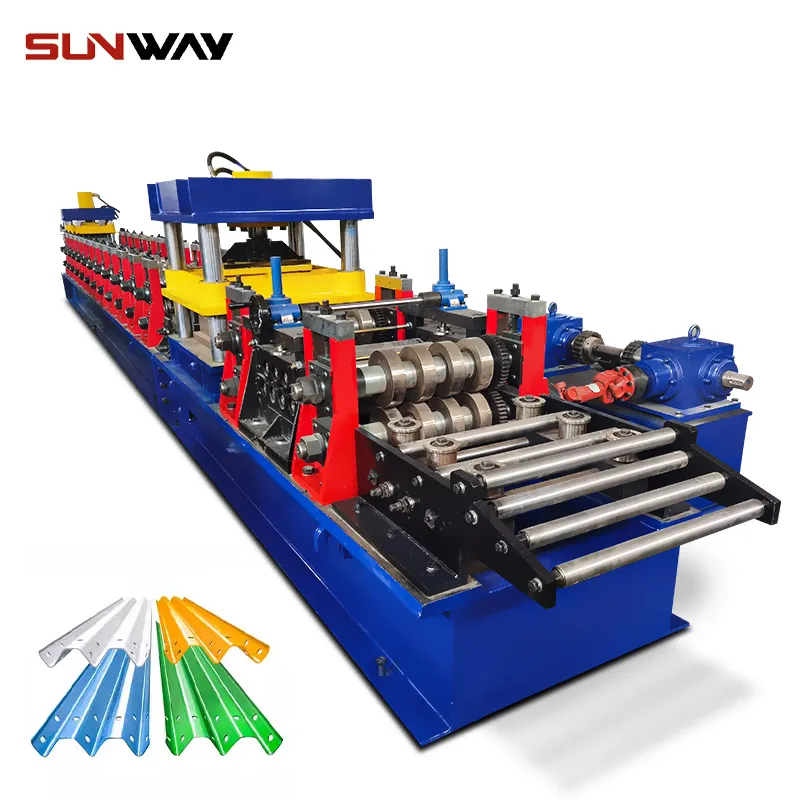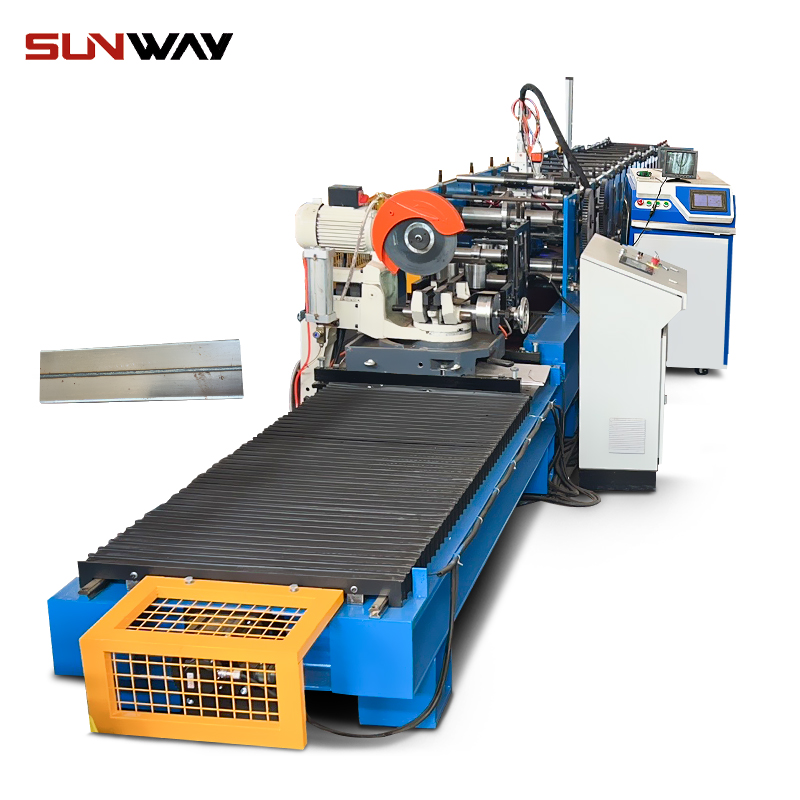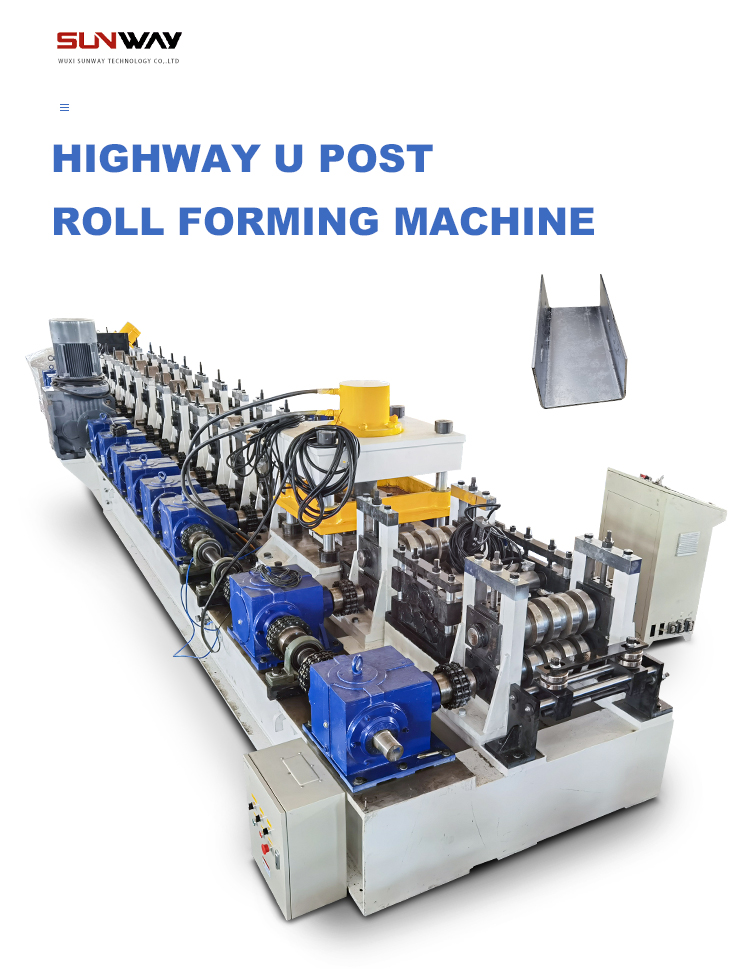Tile roll forming machines are essential equipment for tile manufacturers. This guide provides a detailed overview of tile roll forming machine types, characteristics, applications, specifications, suppliers, installation, operation, maintenance, and more.
Overview of Tile Roll Forming Machines
Tile roll forming machines take flat metal coils and form them into profiles for roofing tiles, wall tiles, and floor tiles. The roll forming process involves gradually bending the strip material through a series of rollers until the desired cross-sectional shape is achieved.
Key benefits of tile roll forming machines:
- Highly efficient continuous production of tile profiles
- Capable of high output with speeds up to 35 m/min
- Repeatability and precision in forming tile shapes
- Flexibility to switch between different tile profiles
- Lower tooling costs compared to other forming methods
- Minimal material waste
Roll formed tiles have excellent strength and durability while being lightweight and easy to install. Tile roll forming technology enables efficient mass production of quality metal tiles.
Types of Tile Roll Forming Machines
There are two main types of tile roll forming machines:
| Type | 描述 |
|---|---|
| C and Z Tile Roll Forming Machines | Have C-shaped or Z-shaped forming stands with horizontal incoming and outgoing tile paths. Allow forming more complex and deeper profiles. |
| U and O Tile Roll Forming Machines | Have U-shaped or O-shaped stands with vertical incoming and outgoing tile paths, taking up less floor space. Best for simpler, shallower profiles. |
In addition, there are reversible and non-reversible machines:
- Reversible machines can produce tile profiles with patterns on both sides.
- Non-reversible machines can only form patterns on one side.
Main Components of Tile Roll Forming Machine
The key components of a tile roll forming machine include:
- Decoiler: Feeds metal coil strip into the roll forming section
- Guiding system: Guides strip through machine and evens coil tension
- Roll forming stands: Progressively bend strip through series of stands
- Cutting device: Cuts formed tile profiles to length
- Counting device: Counts cut tiles
- Hydraulic system: Applies even pressure to forming rollers
- Control panel: Controls machine parameters and production

Applications and Uses of Tile Roll Forming Machines
Tile roll forming machines are widely used by tile manufacturers to produce different types of profiled tiles out of metal coils:
Roofing Tiles
- Corrugated roofing sheets
- Trapezoidal roof panels
- Standing seam roof panels
- Interlocking roof shingles
- Metal roof tiles replicating clay or concrete roof tiles
Wall Tiles
- Decorative exterior wall panels
- Metal siding profiles
- Perforated decorative tiles
- Interlocking wall shingles
Floor Tiles
- Interlocking floor tiles
- Anti-slip floor tiles
- Grating and checker plate tiles
Specifications and Design of Tile Roll Forming Machines
Key specifications and design parameters for tile roll forming machines include:
| Parameter | Typical Values |
|---|---|
| बनाने की गति | 10 – 35 m/min |
| Max Coil Width | 1015 mm |
| Min Coil Thickness | 0.15 mm |
| Max Coil Thickness | 1.5 mm |
| Formed Tile Height | 8 – 150 mm |
| 长度公差 | ± 1 mm |
| Hydraulic Power | 5.5 – 30 kW |
| Machine Weight | 2000 – 6000 kg |
- Number of forming stands is based on profile depth and complexity
- Distance between stands impacts profile accuracy
- Roll diameters, shapes, and materials determine quality of formed tiles
- Larger machines used for higher volumes, smaller ones for special profiles
Tile roll forming machines are designed according to applicable standards and buyer specifications. ISO, ASTM, EN standards cover materials, dimensions, testing, safety, etc.
Suppliers of Tile Roll Forming Machines
There are many manufacturers supplying tile roll forming machines worldwide. Here are some of the major suppliers:
| Supplier | Location | Machines | Price Range |
|---|---|---|---|
| Zhongtuo Roll Forming Machinery | China | C & Z machines up to 35 m/min | $8,000 – $60,000 |
| T&H Lemont | इटली | High-speed C machines up to 75 m/min | $100,000 – $250,000 |
| Formtek | USA | O and U machines for wall/floor tiles | $50,000 – $150,000 |
| Kinhill Engineers | भारत | Smaller reversible machines up to 15 m/min | $15,000 – $50,000 |
| SSE Enterprise | Thailand | Compact machines for 30-50 mm tiles | $5,000 – $15,000 |
Pricing varies based on speed, size, automation features, and customization. Chinese manufacturers offer cost-effective machines while European/US suppliers provide high-speed/high-precision equipment.

Installation and Setup of Tile Roll Forming Machines
Proper installation is key for tile roll forming machines to function accurately and efficiently:
- Strong level concrete foundations needed to prevent vibration
- Machine anchoring according to manufacturer instructions
- Enough space around for safe operation and maintenance access
- Power supply connections as per electrical load requirements
- Decoiler unit should be mounted on raised platform for proper coil alignment
- Trial runs with plastic/paper to check formed profiles before using coils
Ideally a test run or inspection by supplier representatives is done before full production. Proper machine setup and calibration prevents defects in roll formed tiles.
Operation and Maintenance of Tile Roll Forming Machines
To achieve smooth operation and long machine life, some key operation and maintenance best practices for tile roll forming machines include:
Operation
- Select tooling for desired profile and install properly according to roller layout
- Ensure machine settings are calibrated and work safely up to max rated speed
- Monitor strip feed, pre-punch if needed for difficult alloys/tempers
- Use coils of recommended alloys and thicknesses
- Control line speed based on coil quality to prevent jamming
- Apply lubricants properly on formed tiles without contaminating them
- Inspect finished tiles periodically for defects
Maintenance
- Clean machine regularly to prevent accumulated dirt/metal dust
- Lubricate bearings, gears, chains as per schedule
- Check hydraulic oil levels and top up when needed
- Monitor wear on forming rollers and change when damaged
- Check strip guides for bends/wear and replace if not straight
- Retighten any loose fasteners on stands or connections
- Repair or replace damaged/worn components like cutoff dies
How to Choose a Tile Roll Forming Machine Supplier
When selecting a tile roll forming machine, here are key considerations for choosing the right supplier:
- Type and specs of machine matching required capacity and tile profiles
- Reliable after-sales service for maintenance and troubleshooting
- Quick turnaround on spare parts and consumables
- Responsiveness to requests for machine upgrades or additions
- Flexibility for modifications and customization
- Reasonable pricing for base machine and additional tooling
- Supplier track record, reviews, and reputation
- Local representation if sourcing from foreign manufacturers
- Warranties and guarantees on machine performance
Visiting a supplier’s manufacturing facility provides helpful insights on their production quality and capabilities.
Comparison of Tile Roll Forming Machines
| Machine Type | 优势 | Limitations |
|---|---|---|
| C & Z Tile Machines | – Deeper profile forms<br>- Higher outputs<br>- Reversible option | – Larger footprint<br>- Higher cost |
| U & O Tile Machines | – Compact design <br>- Lower cost | – Limited to simpler profiles<br>- Lower speeds |
| Reversible Machines | – Forms patterns on both sides | – Lower speeds<br>- Higher maintenance |
| Non-reversible Machines | – Higher speeds<br>- Lower operating costs | – Single sided patterns only |
C & Z vs. U & O: C and Z roll machines are better suited for complex tile profiles while U and O work for simpler, shallow profiles.
Reversible vs. Non-reversible: Reversible machines allow patterning on both sides but have lower speeds and higher maintenance needs compared to non-reversible machines.

常见问题解答
Q: What is the cost of tile roll forming machines?
A: Tile roll forming machine prices range from $5,000 for basic machines up to $250,000 for high-speed, fully automated machines. Exact cost depends on speed, size, features, and customization.
Q: Can tile roll forming machines make different profiles?
A: Yes, by changing the roll tooling different tile profiles can be produced on the same machine. Quick change tooling allows fast profile changes.
Q: How to choose right thickness of coils for roll forming tiles?
A: Follow the machine specifications for min and max coil thickness. Typically 0.4-0.7 mm coils are used. Softer temper coils like annealed are easier to form vs harder tempers.
Q: What safety measures are required?
A: Safety features like emergency stops, guards, light curtains, and two-hand operation are necessary. Safety training and PPE for operators is also mandatory.
Q: How much maintenance is needed?
A: Daily cleaning and lubrication is needed. Periodic activities like roller changes, hydraulic oil changes follow supplier schedule. Breakdown maintenance as needed.
Q: What is the production rate for tile roll forming?
A: Production rates vary from 10-35 meters per minute normally based on machine speed and tile specifications. High-end machines exceed 75 meters per minute.
निष्कर्ष
Tile roll forming is an efficient method for high-volume production of metal roofing, wall, and flooring tiles. With the right forming machine selection, operation, and maintenance, manufacturers can produce quality tiles in different profiles cost-effectively. This guide has provided a detailed overview of all aspects of tile roll forming machines to help potential buyers and users.
Frequently Asked Questions (FAQ)
1) What’s the difference between “main components” on a Tile Roll Forming Machine and optional add-ons?
- Main components are required for core operation: decoiler, guiding system, roll forming stands, cutting unit, hydraulic/pneumatic system, and control panel. Optional add-ons include pre-punch units, embossing stations, coil end joiners, stackers, inline vision, and automatic lubrication.
2) How do the roll forming stands influence tile profile quality?
- Stand count and spacing determine strain distribution; more passes with optimized flower design reduce springback and oil-canning. Precision-machined roll tooling and rigid stand alignment minimize camber and twist in roofing tile panels.
3) Which cutting device is better for tiles: flying shear or stop-to-cut guillotine?
- Flying shear maintains line speed for higher throughput and better edge quality on coated coils. Stop-to-cut is simpler, lower cost, and suitable for shorter runs or thicker gauges where speed is modest.
4) What control features matter most for coated or pre-painted coils?
- Dual (or laser) encoders for accurate cut length without slip, soft-start/soft-stop profiles, closed-loop speed control, minimal-contact guiding, and recipe-based roll gaps to protect coatings and ensure consistent tile emboss depth.
5) Can one Tile Roll Forming Machine handle roofing, wall, and floor tile profiles?
- Yes with modular tooling and adequate motor/stand capacity. However, deep roofing tiles with embossing may require different roll diameters and additional passes versus shallow wall/floor tiles; quick-change cassettes reduce changeover time.
2025 Industry Trends
- Inline embossing and texture control: Servo-emboss modules synchronized with roll stands for consistent tile aesthetics.
- Vision-driven quality assurance: AI vision detects edge wave, scratch, coating defects; auto-adjusts roll gaps and lubrication.
- Energy-optimized drives: IE5 motors and regenerative VFDs lower kWh/ton; maintenance tied to energy KPI alerts.
- Faster changeovers: Cassette tooling and automatic stand positioning bring profile swaps to under 30–40 minutes.
- Standards and traceability: ISO 9001 plus ISO 12100 safety, with MES linkage from coil heat to finished tile barcode.
- Sustainable materials: Wider use of Zn-Al-Mg galvanized and cool-roof coatings; machines tuned for thinner gauges without sacrificing stiffness.
Key 2025 benchmarks for Tile Roll Forming Machines
| Metric | 2022 Typical | 2025 Best-in-class | Why it matters | Sources/Notes |
|---|---|---|---|---|
| Line speed (m/min) | 10–35 | 30–60 (roofing tiles), up to 75 for simple panels | Throughput | The Fabricator (maintenance/roll forming), OEM datasheets |
| Cut length tolerance (mm over 6 m) | ±1.0–2.0 | ±0.5–0.8 | Fit-up on site | Laser/dual encoders; ISO 9001 QMS |
| Changeover time (min) | 90–180 | 25–45 | Fleksibilitas | Cassette tooling; SMED practices (NIST MEP: https://www.nist.gov/mep) |
| OEE (%) | 55–65 | 75–85 | Availability/quality | CMMS + inline vision |
| Energy intensity (kWh/ton) | 150–190 | 110–130 | Cost and sustainability | ISO 50001 programs: https://www.iso.org |
| Coating defect rate (%) | 1.5–3.0 | 0.5–1.0 | Aesthetics/warranty | AI vision (Cognex/Keyence) |
Additional reading:
- The Fabricator—Roll forming guides: https://www.thefabricator.com
- ISO 12100 (machinery safety), ISO 50001 (energy), ISO 9001 (quality): https://www.iso.org
- ASTM A653 / EN 10346 (coated steel sheets): https://www.astm.org, https://standards.iteh.ai
Latest Research Cases
Case Study 1: AI Vision for Coated Roofing Tiles (2025)
Background: A mid-size roofing tile producer saw 2.6% scrap from coating scratches and edge wave on pre-painted coils at 28 m/min.
Solution: Installed inline AI vision for defect classification, added low-friction entry guides, and enabled closed-loop roll-gap micro-adjustments via PLC recipes.
Results: Coating-related scrap fell to 0.9%; line speed increased to 36 m/min; FPY improved from 94.5% to 98.2%; cut-length Cpk rose from 1.2 to 1.7.
Case Study 2: Quick-Change Cassettes Across Roof and Wall Tile Profiles (2024)
Background: Frequent profile changes caused 2–3 hour changeovers and missed delivery windows.
Solution: Implemented cassette tooling for roll stands, color-coded setup gauges, and torque-based gap presets stored per profile.
Results: Average changeover cut to 38 minutes; monthly OEE improved from 61% to 77%; on-time delivery improved by 14%.
Expert Opinions
- Dr. Daniel Schaeffler, President, Engineering Quality Solutions
Viewpoint: “For tile roll forming, consistent coil properties and entry flatness are prerequisites. If the guiding system fights coil set, you’ll chase camber and oil-canning all day.” - Michael Gill, Director of Engineering, Bradbury Group
Viewpoint: “Cassette roll tooling and automatic stand positioning turn tile lines into flexible assets. Pair that with dual-encoder length control for pre-painted panels.” - Sarah Clark, Technical Director, Metal Construction Association
Viewpoint: “Traceability from coil heat to palletized tile stacks is increasingly specified. Maintenance and quality data tied to each batch reduces warranty risk.”
Practical Tools/Resources
- Roll design and simulation: COPRA RF / FEA RF (https://www.data-m.de), UBECO PROFIL (https://www.ubeco.com)
- Inline inspection and metrology: Cognex Vision (https://www.cognex.com), Keyence laser/vision (https://www.keyence.com)
- CMMS/EAM for maintenance: Fiix (https://www.fiixsoftware.com), UpKeep (https://www.upkeep.com), IBM Maximo (https://www.ibm.com/products/maximo)
- Standards and guidelines: ISO 12100, ISO 9001, ISO 50001 (https://www.iso.org); ASTM A653 / EN 10346 (https://www.astm.org, https://standards.iteh.ai)
- Industrial integration: OPC Foundation (OPC UA) (https://opcfoundation.org); Ignition SCADA/MES (https://inductiveautomation.com)
Last updated: 2025-10-20
Changelog: Added 5 targeted FAQs, 2025 benchmark table and trends for Tile Roll Forming Machines, two recent case studies, expert viewpoints, and curated tools/resources with authoritative links
Next review date & triggers: 2026-04-15 or earlier if ISO/ASTM/EN standards update, major OEMs release <30 min cassette changeover solutions, or AI vision/QC tools introduce new closed-loop features
